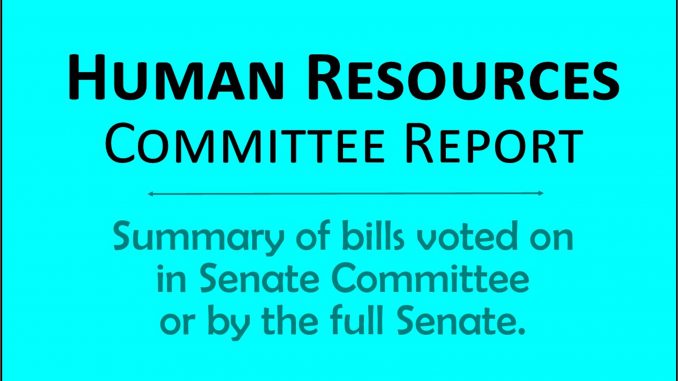
On this page
FLOOR ACTION:
SF 2268 – Child care ratios
SF 2268 increases the number of children that one person can care for at a child care center from one to seven (instead of six) for two-year-old children, and from one to 10 (instead of eight) for three-year-old children. Child care ratio means the number of adults who are present to teach and care for children who are playing, eating, sleeping and doing other activities. Lower ratios mean children get more one-on-one attention to help them feel safe and secure. This bill allows higher ratios.
[2/21: 32-18, party-line (No: Democrats)]
COMMITTEE ACTION:
SF2216 – Intensive Psychiatric Beds
SF 2216 establishes state intensive psychiatric units at Independence Mental Health Institute (MHI) and Cherokee MHI. The Department of Human Services (DHS) must establish intensive psychiatric units for adults and children. The bill requires 12 beds at each MHI. It also allows the beds to be used for lower-level acuity if availability exists. DHS will gather data to determine the effectiveness of each unit and report the details to the Legislature four years after the unit becomes operational. The Legislature must then decide on continuing the units within one year of the report.
[2/17: short form (No: Bolkcom)]
SSB 3144 – Psychiatric bed tiered rates
SSB 3144 is based on a recommendation of the Bed Tracking Study Committee. No later than January 1, 2023, the Department of Human Services must implement a tiered-rate reimbursement methodology for psychiatric intensive inpatient care under the Medicaid program. The tiered rates will be based on level of patient acuity and other factors recommended by the study committee. Recipients of the tiered rates must follow the state’s real-time inpatient psychiatric bed tracking system.
[2/17: short form]
SF 2028 – Documented consent for minor vaccinations and immunizations
SF 2028, as amended, requires prior documented consent by a minor’s parent or guardian for immunizations or vaccinations unless otherwise specifically provided under federal or state law.
[2/17: 8-5, party-line (No: Democrats)]
SF 2258 – Timing of rate increase payments to nursing facilities
SF 2258 authorizes the Department of Human Services (DHS) to release new reimbursement rates for nursing facilities prior to receiving approval from the Centers for Medicaid and Medicare (CMS). The will reduce retroactive rate processing by allowing the legislative rate increase to start at the beginning of the fiscal year rather than paying the old rate for several months, getting the CMS approval, and then making revised payments.
[2/17: short form]
SSB 3122 – Newborn screenings
SSB 3122, as amended, codifies the Congenital and Inherited Disorders Advisory Committee (currently only in Rules). The bill sets out the membership and duties of the committee. Beginning July 1, 2022, the committee will ensure all conditions in the federal Recommended Uniform Screening Panel (RUSP) as of January 1, 2022, are included in the Iowa newborn screening. Within 12 months of a new condition by the RUSP, the committee will recommend to the Iowa Department of Public Health whether the condition should be added to the Iowa Newborn Screening Panel. If the committee recommends adding a condition, IDPH will add it to the panel within 18 months. Iowa currently screens for 32 of the 35 RUSP conditions. The bill directs the State Hygienic Laboratory to establish the newborn screening fee schedule in a manner sufficient to cover the costs. IDPH must report to the Legislature annually by December 31. The bill also changes the term “Newborn Metabolic screening” to “Newborn Screening.”
[2/17: short form]
SSB 3145 – Maternal support and Medicaid postpartum coverage
SSB 3145, as amended, appropriates $2 million and directs the Department of Human Services (DHS) to create a statewide network for maternal health services called “More Options for Maternal Support (MOMS).” The bill specifies the design of the program and the nonmedical services to be funded. DHS is to issue an RFP to select a non-profit program administrator. The nonmedical services are to promote childbirth and/or adoption, and not abortion. The MOMS program is modeled after the Texas Pregnancy Care Network. The MOMS program will NOT provide any information related to contraceptives or preventing unintended pregnancies. The bill sets out reporting requirements. The program is focused on women who are already pregnant.
The bill also appropriates $5.6 million in FY23 and $8.9 million in FY24 to DHS to fund extended postpartum coverage for Medicaid members. It is currently 60 days. DHS will submit a State Plan Amendment (SPA) for approval to extend coverage to 12 months.
[2/17: 8-5, party-line (No: Democrats)]
